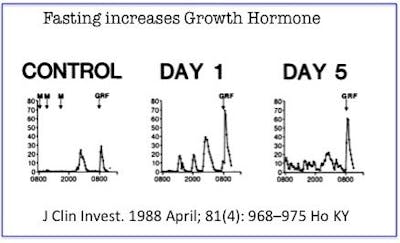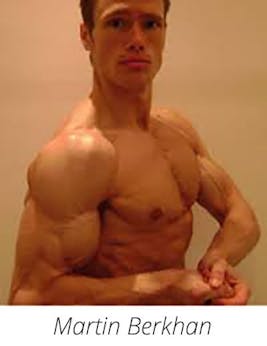drtbear1967
Musclechemistry Board Certified Member
Fasting to increase growth hormone
In 1982, Kerndt et al published a study of a single patient who decided to undergo a 40-day fast for religious purposes. Glucose goes down. From 96 initially, it drops to 56. Insulin goes way, way down. Starting at 13.5, it quickly drops to 2.91 and stays down. That is almost an 80% drop! If you are concerned about a disease such as type 2 diabetes, with hyperinsulinemia, nothing beats fasting to bring down those sky high insulin levels.
But our concern here is HGH. It starts at 0.73 and peaks at 9.86. That is a 1,250% increase in growth hormone. A shorter 5 day fast gives a 300% increase. All this HGH increases without drugs.

What about the potential side effects? Increased glucose? Nope. Increased blood pressure? Nope. Higher risk of cancer? Hardly.
Other studies have shown the same increase in growth hormone. In 1988, Ho KY et al studied fasting and HGH. On the control day, you can see that meals (marked M) very effectively suppress HGH secretion. This is to be expected. Like cortisol, HGH increases glucose and thus is suppressed during feeding.
Fasting is a great stimulus to HGH secretion. During fasting, there is the spike in the early morning, but there is regular secretion throughout the day as well. Hartman et al also showed a 5 fold increase in HGH in response to a 2 day fast.
This HGH is crucial in the maintenance of lean mass – both muscle and bone. One of the major concerns about fasting is the loss of lean mass. Some people claim that fasting a single day causes loss of ¼ pound of muscle. Studies prove that this does not occur. In fact, the opposite can happen. In comparing caloric reduction diets to fasting, the fasting was 4 times better at preserving lean mass! Think about this for a second.
Let’s imagine that we are living in Paleolithic times. During the summer of plenty, we eat lots of food and store some of that as fat on our body. Now it is winter, and there is nothing to eat. What do you suppose our body does. Should we start burning our precious muscle while preserving our stored food (fat)? Doesn’t that sound pretty idiotic?
It’s as if you store firewood for a wood-burning oven. You pack lots of firewood away in your storage unit. In fact, you have so much, it is spilling out all over your house and you don’t even have enough room for all the wood you’ve stored. But when the time comes to start up the oven, you immediately chop up your sofa and throw that into the oven. Pretty stupid right? Why would we assume our body is also so stupid?
The logical thing to do is to start burning the stored wood. In the case of the body, we start to burn the stored food (fat stores) instead of burning precious muscle. Some protein is catabolized for gluconeogenesis, but the increase in HGH maintains lean mass during fasting.
Implications for athletes
This has enormous implications for athletes. This is called ‘training in the fasted state’. Increased nor-adrenalin from fasting will pump you up to train harder. At the same time, the elevated HGH stimulated by fasting should increase muscle mass and make recovery from a workout easier and faster. This would be an important advantage in elite level athletes, and we are seeing more and more interest in doing this exact sort of protocol.

It is not by accident that many of the early proponents of training in the fasted state are bodybuilders. This is a sport that demands, in particular, high intensity training and extremely low body fat for definition.
For example, Brad Pilon, who wrote the book “Eat, Stop, Eat” is a bodybuilder, as is Martin Berkhan, who popularized the ‘lean gains’ method of fasting. Somehow, I don’t think that fasting for these two fellows was ‘eating’ their muscle.

So, for all those people who thought that fasting would make you tired, or that you could not exercise during fasting, well, you’re just wrong. Fasting does not ‘burn’ muscle. There is no ‘starvation’ mode from fasting where you shrivel up into the fetal position on your couch.
Rather, fasting has the potential to unleash the anti-aging properties of HGH without any of the problems of excessive HGH (prostate cancer, increased blood sugar, increased blood pressure). For those interested in athletic performance, the benefits are even greater.
So, let’s see. Train harder. Lose weight. Faster recovery. Decrease insulin and insulin resistance. Decrease blood sugars. All of these benefits are achieved without drugs, supplements or cost. Yes, like all the best things in life, it’s free. So why is everybody so against it?
In 1982, Kerndt et al published a study of a single patient who decided to undergo a 40-day fast for religious purposes. Glucose goes down. From 96 initially, it drops to 56. Insulin goes way, way down. Starting at 13.5, it quickly drops to 2.91 and stays down. That is almost an 80% drop! If you are concerned about a disease such as type 2 diabetes, with hyperinsulinemia, nothing beats fasting to bring down those sky high insulin levels.
But our concern here is HGH. It starts at 0.73 and peaks at 9.86. That is a 1,250% increase in growth hormone. A shorter 5 day fast gives a 300% increase. All this HGH increases without drugs.

What about the potential side effects? Increased glucose? Nope. Increased blood pressure? Nope. Higher risk of cancer? Hardly.
Other studies have shown the same increase in growth hormone. In 1988, Ho KY et al studied fasting and HGH. On the control day, you can see that meals (marked M) very effectively suppress HGH secretion. This is to be expected. Like cortisol, HGH increases glucose and thus is suppressed during feeding.
Fasting is a great stimulus to HGH secretion. During fasting, there is the spike in the early morning, but there is regular secretion throughout the day as well. Hartman et al also showed a 5 fold increase in HGH in response to a 2 day fast.
This HGH is crucial in the maintenance of lean mass – both muscle and bone. One of the major concerns about fasting is the loss of lean mass. Some people claim that fasting a single day causes loss of ¼ pound of muscle. Studies prove that this does not occur. In fact, the opposite can happen. In comparing caloric reduction diets to fasting, the fasting was 4 times better at preserving lean mass! Think about this for a second.
Let’s imagine that we are living in Paleolithic times. During the summer of plenty, we eat lots of food and store some of that as fat on our body. Now it is winter, and there is nothing to eat. What do you suppose our body does. Should we start burning our precious muscle while preserving our stored food (fat)? Doesn’t that sound pretty idiotic?
It’s as if you store firewood for a wood-burning oven. You pack lots of firewood away in your storage unit. In fact, you have so much, it is spilling out all over your house and you don’t even have enough room for all the wood you’ve stored. But when the time comes to start up the oven, you immediately chop up your sofa and throw that into the oven. Pretty stupid right? Why would we assume our body is also so stupid?
The logical thing to do is to start burning the stored wood. In the case of the body, we start to burn the stored food (fat stores) instead of burning precious muscle. Some protein is catabolized for gluconeogenesis, but the increase in HGH maintains lean mass during fasting.
Implications for athletes
This has enormous implications for athletes. This is called ‘training in the fasted state’. Increased nor-adrenalin from fasting will pump you up to train harder. At the same time, the elevated HGH stimulated by fasting should increase muscle mass and make recovery from a workout easier and faster. This would be an important advantage in elite level athletes, and we are seeing more and more interest in doing this exact sort of protocol.

It is not by accident that many of the early proponents of training in the fasted state are bodybuilders. This is a sport that demands, in particular, high intensity training and extremely low body fat for definition.
For example, Brad Pilon, who wrote the book “Eat, Stop, Eat” is a bodybuilder, as is Martin Berkhan, who popularized the ‘lean gains’ method of fasting. Somehow, I don’t think that fasting for these two fellows was ‘eating’ their muscle.

So, for all those people who thought that fasting would make you tired, or that you could not exercise during fasting, well, you’re just wrong. Fasting does not ‘burn’ muscle. There is no ‘starvation’ mode from fasting where you shrivel up into the fetal position on your couch.
Rather, fasting has the potential to unleash the anti-aging properties of HGH without any of the problems of excessive HGH (prostate cancer, increased blood sugar, increased blood pressure). For those interested in athletic performance, the benefits are even greater.
So, let’s see. Train harder. Lose weight. Faster recovery. Decrease insulin and insulin resistance. Decrease blood sugars. All of these benefits are achieved without drugs, supplements or cost. Yes, like all the best things in life, it’s free. So why is everybody so against it?

